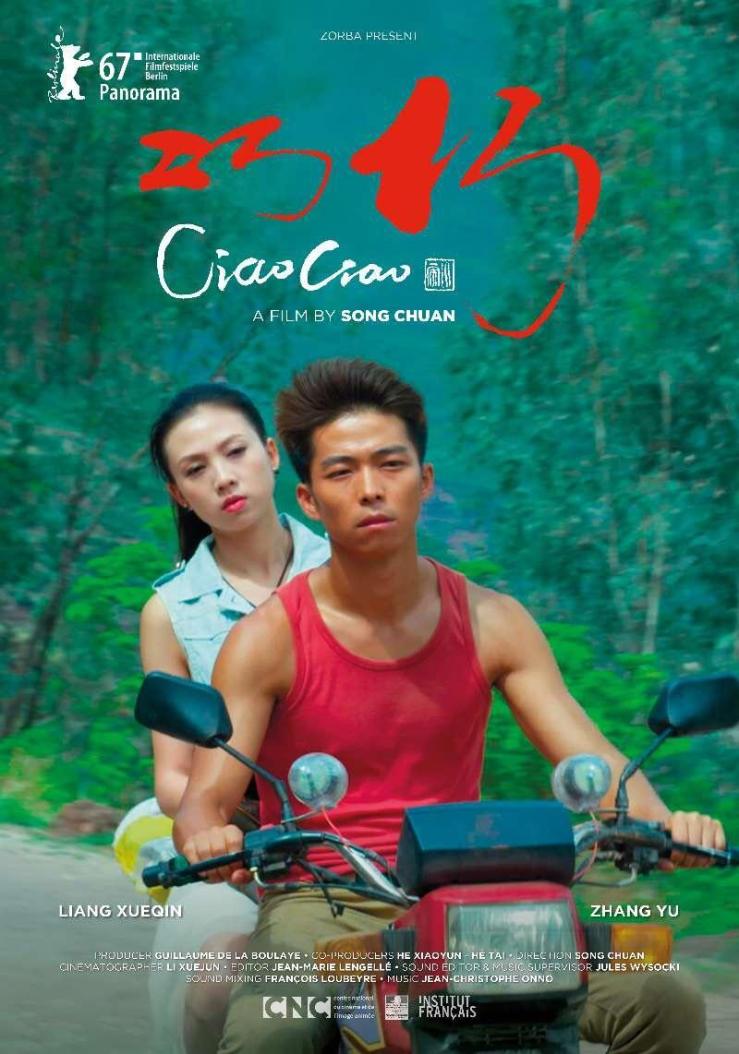
Released: 2017 Viewed: April 2019
The film, by director Song Chuan, opens and closes with a shot of an elevated railway line carrying a train though an almost deserted valley in southern Yunnan province.
Qiaoqiao [Liang Xueqin] has returned home to her little village in Yunnan after working in Guangzhou. Her work in the city is never specified although the locals speculate that it was not something of which Public Security would approve. She wanders around the sleepy village looking (to quote Raymond Chandler) as inconspicuous ‘as a tarantula on a slice of angel food cake’, throwing rocks at kids who call her ‘slut’ and talking to her friend in Guangzhou on WeChat. She initially plans to return to the city but inevitably flirts with the (two) available young men.

Li Wei [Zhang Yu] is the son of a local illicit alcohol merchant (who is also the lover of Qiaoqiao’s mother). Wei had worked in Zhejiang but, having beaten up a man in a fight, has come home to hide out. He spends his time ‘gambling and whoring’. The other, more sympathetic, is an unnamed hairdresser [Zhou Quan] who claims to have worked in Guangzhou. Although, Qiaoqiao seems initially more interested in the hairdresser, she eventually takes up with and then marries Wei.
This is one of the weakest points of the film as her reasons for choosing Wei are never made clear. The film suggests that she sees him as a way to return to the city. But, if so, the feckless and violent Wei is a poor choice. Qiaoqiao is neither sentimental nor stupid so her choice of men makes little sense. But then we don’t know anything about her experiences in Guangzhou or why she decided to return home.
Almost inevitably, Qiaoqiao gets bored and turns to the hairdresser who is also planning to return to the city. But in a small village it is difficult to keep secrets.
Not much happens in the film and much of what does is kept off-camera. The film is all the more effective for this underplaying. In truth, there is not much new in the film but it is an effective look (yet again) at rural-urban migration in China and the boredom of village life. The cinematography [by Li Xuejun] is beautiful and makes the film look less dark than its content would imply. The actors all look convincing in their roles even if their characters are rather underdeveloped in this short film.
 It is another Chinese film which was made with outside funds and support (largely French) and has not been commercially released in China. Some scenes of nudity and sex would prevent its release in its current form. The French influence perhaps explains the spelling of Qiaoqiao in the title although it is less clear why the subtitles refer to Guangzhou as Canton (a term currently used only by Jacob Rees-Mogg).
It is another Chinese film which was made with outside funds and support (largely French) and has not been commercially released in China. Some scenes of nudity and sex would prevent its release in its current form. The French influence perhaps explains the spelling of Qiaoqiao in the title although it is less clear why the subtitles refer to Guangzhou as Canton (a term currently used only by Jacob Rees-Mogg).

[…] which have focused on everyday issues. These include films such as Angels Wear White; Baby; Ciao Ciao; An Elephant Sitting Still; The Foolish Bird; Girls Always Happy; The Looming Storm; and The […]
LikeLike